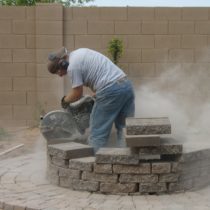Landscape Architecture for Landscape Architects › Forums › GENERAL DISCUSSION › Is LEED Enough?
- This topic has 1 reply, 8 voices, and was last updated 16 years, 1 month ago by
 nca.
nca.
-
AuthorPosts
-
June 22, 2009 at 3:44 am #173922
Anonymous
InactiveBelow is a link to an article that appeared in a Central PA business newspaper. It raises many question. Is having a LEED certified building really more green? Does it reward the wrong accomplishments? Does LEED accomplish more by opening discussion than earning points? No real question here, I just would like to hear other opinions on the subject.
June 22, 2009 at 8:58 am #173937 ncaParticipant
ncaParticipantI think LEED is bringing better public awareness to the role of design and engineering in addressing environmental issues. Unfortunately, I think LEED is focused too much on architecture and mechanical systems within the microcosm of the building.
What turns me off about LEED in general is that it is inherently objective and tends to award points based on the gadget-iness of solutions instead of addressing issues through more sensible and comprehensive ways. If, for example, you can earn points for reducing irrigation by 50% it’s easy to simply use less turf and make everything native, but this may not be the best solution taking into consideration site and human needs. In this sense, earning LEED points becomes a priority over program or sensible design.
The question then is whether these complex solutions are really accessible to the average user and whether or not they care. Does every landscape need to have a pedagogic objective? If you look at Olmsted’s work which has lasted for decades and centuries he was not so concerned, if at all, it seems with educating the public about environmental systems. If he was, he embedded this in his work which was first and foremost designed to provide pleasure and experience for it’s users.
Lately, it seems every project needs to have some revelatory component with deep and complicated systems. Unfortunately, I think something is lost from the users standpoint in the designers pursuit of deeper meaning.
June 22, 2009 at 2:53 pm #173936Erica Petersen
ParticipantLEED is a step in the right direction. It’s raises awareness, but too many people are focused on the end product instead of the concept. Going green has become trendy–all of the celebrities are doing it. Saying your green hold more weight than proving that you’re actually helping the environment. We need to remember that being green is for the environment, not PR.
June 22, 2009 at 3:02 pm #173935 Jay NeelyParticipant
Jay NeelyParticipantMy key takeaway from the article was that LEED is too much of a checklist of efforts, not accomplishments. It doesn’t matter how many green materials or techniques you use if the building still isn’t energy efficient.
Nick, good points, though I think the trend of seeking deeper meaning at the expense of usability has been going for much longer than the green ‘revolution’.
June 22, 2009 at 3:15 pm #173934 Clayton MunsonParticipant
Clayton MunsonParticipantAgreed. The term Green and Green Living have been tossed around so much that they have begun to lose their meaning. A great book that really makes the reader think about this whole phenomenon is Cradle to Cradle. A couple examples they give are that the whole 3R’s are not really all that great. Especially when it comes to recycling; they explain recycling as begin less bad. In the end the product will eventually end up in the landfill. Also as products are recycled the materials that remain are degraded. Another example that stuck with me through reading the book was that people are trying to make building more efficient which is all well and good but one way that they are doing it is by sealing that buildings up (no drafts) well in doing so the toxins that are released inside the building are not removed, because the HVAC system is unable to handle them so it has to be upgraded which in turn uses more energy.
This is all coming out of my memory so don’t take it as fact, get the book and read it and you will be surprised at what is going on in the so called Green Movement.
June 22, 2009 at 3:30 pm #173933 ncaParticipant
ncaParticipantErica-
I agree, and well stated. Though I see it as many are focused on touting the concept, though action typically falls short.
Jay-
You’re right, and I’m probably swaying the conversation off topic, but I think it’s worth mentioning the notion that everything in our society seems to require ‘official’ endorsement with specific objectives. The issue, I think is that as designers, whether you are an engineer, LA, arch, or otherwise) is that it is all too easy to get caught up in meeting objectives and not accomplishing a goal.
June 22, 2009 at 4:10 pm #173932 Jay NeelyParticipant
Jay NeelyParticipantWell said.
June 23, 2009 at 2:30 pm #173931 Mark LerchParticipant
Mark LerchParticipantI agree with the writer of the letter, Dan Kerr. It is not enough to just acquire LEED certification without verifying that there is a quantifiable gain in doing so. If there is not some accountability and proof that being LEED certified is actually accomplishing what it is supposed, energy efficiency and environmental compatibility, then it will probably be replaced by something else that is more successful. I know that there are many people jumping on this bandwagon now that have little knowledge of what it means to be promoting sustainability. They are much more interested in what it can do to promote their careers because they know rising waters lift all boats. I am cynical when these people approach me but at the same time they are looking to us for help and does it really matter what the motive is? It is important though that this goes beyond being just good publicity if it is going to have a beneficial outcome in the end. As the writers before me have indicated it is going to require follow-through and accountability.
June 23, 2009 at 4:26 pm #173930biancaKOENIG
ParticipantLEED is a continually evolving system of quantifying “green” and sustainable projects. It’s fast become an internationally recognized credidation system and has teamed with a multitude of organizations to achieve and quantify common goals. Keep an eye out for progress on LEED-ND, LEED for Neighborhood Development because having a “green building” out in the middle of nowhere may not necessarily be the most sustainable solution. http://www.usgbc.org/DisplayPage.aspx?CMSPageID=148
For more inspiration, check out the Cascadia Chapter of USGBC. They are making great steps to push LEED to not just be “sustainable” (doing less bad) but instead to be “regenerative” (doing more good). http://www.cascadiagbc.org/
Also to note and look out for, “greenwash” is now a part of the american dictionary:
green·wash (grēn’wŏsh’, -wôsh’)
n.
1. The dissemination of misleading information by an organization to conceal its abuse of the environment in order to present a positive public image.
2. The information so disseminated.June 23, 2009 at 4:59 pm #173929 ncaParticipant
ncaParticipantBianca-
I was going to bring up LEED-ND, or maybe I did.
I think ND seems like a good complement to NC for planners, ud’s, and LA’s to practice sustainable design, but again within the sort of self-fulfilling microcosm of a given development. In other words, I don’t think ND puts site selection and contextual, regional issues in the hands of the designers, which I think everyone would agree is where sustainable design truly occurs.
Again, I think LEED is as you said a step in the right direction to quantifying sustainable design, the downfall is that it seems to play in the short term physical realm, or ‘gadgetry’ of a project and doesnt take the other spheres of sustainability into account such as the social, economic, or cultural issues. Maybe this is just unrealistic to expect?
June 23, 2009 at 5:31 pm #173928biancaKOENIG
ParticipantUSGBC and the LEED rating system are serious about addressing the social, economic and cultural issues and it is not unrealistic to expect this of them. View their Guiding Principles
If Landscape Architects want to be involved during project inception and site selection, then they need to be acting as the developer or develop strong, trusting relationships with developers. Or, get involved in the community development and planning agencies. This can be done without a rating system.
Did you get a chance to review the pilot version of LEED-ND? I believe they are addressing local and regional issues. They are also currently in the process of developing Regional Priority Points to be designated by zipcode. If you are interested in being a part of the task force for your region, I recommend contacting your local USGBC Chapter, becoming a member and submiting an application. Act fast, applications are due by the end of the month.
June 23, 2009 at 7:07 pm #173927Brian Hochstein
ParticipantMarc,
Thanks for finding this and posting. The article sums up my core concerns with LEED. I have always felt that there is no true accountability and the focus is actually on the reward of a LEED designation rather than creating more efficient spaces.
I have many other concerns that I won’t bring up here but I do think that it is time to consider helping our clients understand the difference between being LEED certified and Green. In the course of doing so we may save them a substantial sum of money now in design and later in the lifecycle of their building/site.
June 23, 2009 at 7:24 pm #173926 ncaParticipant
ncaParticipantBianca-
Thanks for the ‘guiding principles’ link. I see how the USGBC defines sustainability as a concept, but do you see evidence for this in real-life projects?
I’m not insinuating that designers can or should mettle in the business of land development, but that there seems to be a gap in the LEED system between concept and application.
June 23, 2009 at 7:25 pm #173925 ncaParticipant
ncaParticipantBrian-
I think there is alot of truth to your statement.
June 23, 2009 at 7:32 pm #173924Anonymous
InactiveBrian,
I had similar feelings after reading this article over the weekend, which is the first reason I posted the article. The second reason I posted it was to find out how others felt about it. Having your opinions challenged is a great way to keep yourself in check!
-
AuthorPosts
- You must be logged in to reply to this topic.



